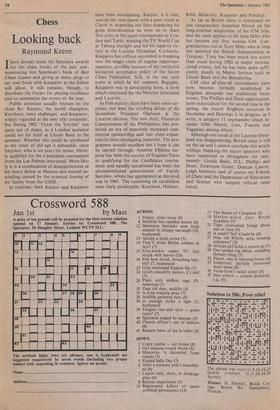Chess
Looking back
Raymond Keene
Ihave already made the Spectator awards for the chess books of the past year, nominating Jon Speelman's book of Best Chess Games and giving as many plugs to my own book with Kasparov as the Editor will allow. It still remains, though, to distribute the Oscars for playing excellence and to summarise the events of the year.
Public attention usually focuses on the three Ks: Karpov, the world champion, Korchnoi, twice challenger, and Kasparov, widely regarded as the next title contender, but during 1982 'Victor the Terrible' was quite out of shape, as a London audience could see for itself at Lloyds Bank in the summer. Whether this could be attributed to the onset of old age is debatable, since Smyslov, who is ten years his senior, blithe- ly qualified for the Candidates tournament from the Las Palmas interzonal. More like- ly it is a combination of disappointment at his heavy defeat at Merano and mental un- winding caused by the eventual freeing of his family from the USSR.
In contrast, both Karpov and Kasparov have been outstanding. Karpov, it is true, started this year slowly with a poor result at Clarin in Argentina but then displaying his great determination he went on to share first prize in the super-tournaments at Lon- don and Turin, winning the TV World Cup at Tilburg outright and led his team to vic- tory in the Lucerne Olympiad. Curiously, Kasparov has still not succeeded in breaking into the magic circle of regular supertour- naments, possibly because of the restrictive invitation acceptance policy of the Soviet Chess Federation. Still, in the one such event in which he did compete, Bugojno, Kasparov was in devastating form, a form which continued for the Moscow interzonal and Lucerne.
In Fide matters there have been some sur- prises, not least the crushing defeat of the incumbent President Olafsson at the Lucerne election. The new chief, Florencio Campomanes of the Philippines, has pro- mised an era of massively increased com- mercial sponsorship and vast chess expan- sion in chess developing countries. The pro- gramme sounds excellent but I hope it can be carried through. Another Filipino sur- prise has been the success of Eugenio Torre in qualifying for the Candidates tourna- ment and equally sensational has been the aforementioned achievement of Vassily Smyslov, whose last appearance at this level was in 1965. The remaining six candidates were fairly predictable: Korchnoi, Hubner, Ribli, Beliaysky, Kasparov and Portisch.
As far as British chess is concerned we can congratulate Jonathan Mestel on the long-overdue acquisition of his GM title, and the same applies to Dr Jana Miles who has become our first woman GM. Con- gratulations too to Tony Miles who at long last annexed the British championship at Torquay. Tony has been much less active than usual during 1982 in major interna- tional events, but he has been quite suffi- ciently deadly in Master Swisses such as Lloyds Bank and the Benedictine.
GM class all-play-all tournaments have now become formally established in England alongside our traditional Swiss events. The Phillips and Drew supertourna- ment materialised for the second time in the spring, the fourth Brighton occurred in December and Hastings is in progress as I write, a category 11 tournament which in- cludes GMs Mestel, Lein, Ftacnik and Vaganian among others.
Although our result at the Lucerne Olym- piad was disappointing, British chess is still on the up and I cannot conclude this article without thanking the major sponsors who have supported us throughout the year, namely: Lloyds Bank, ICL, Phillips and Drew, Grieveson Grant, Duncan Lawrie, Leigh Interests, and of course the Friends of Chess and the Department of Education and Science who support official team travel.


































 Previous page
Previous page